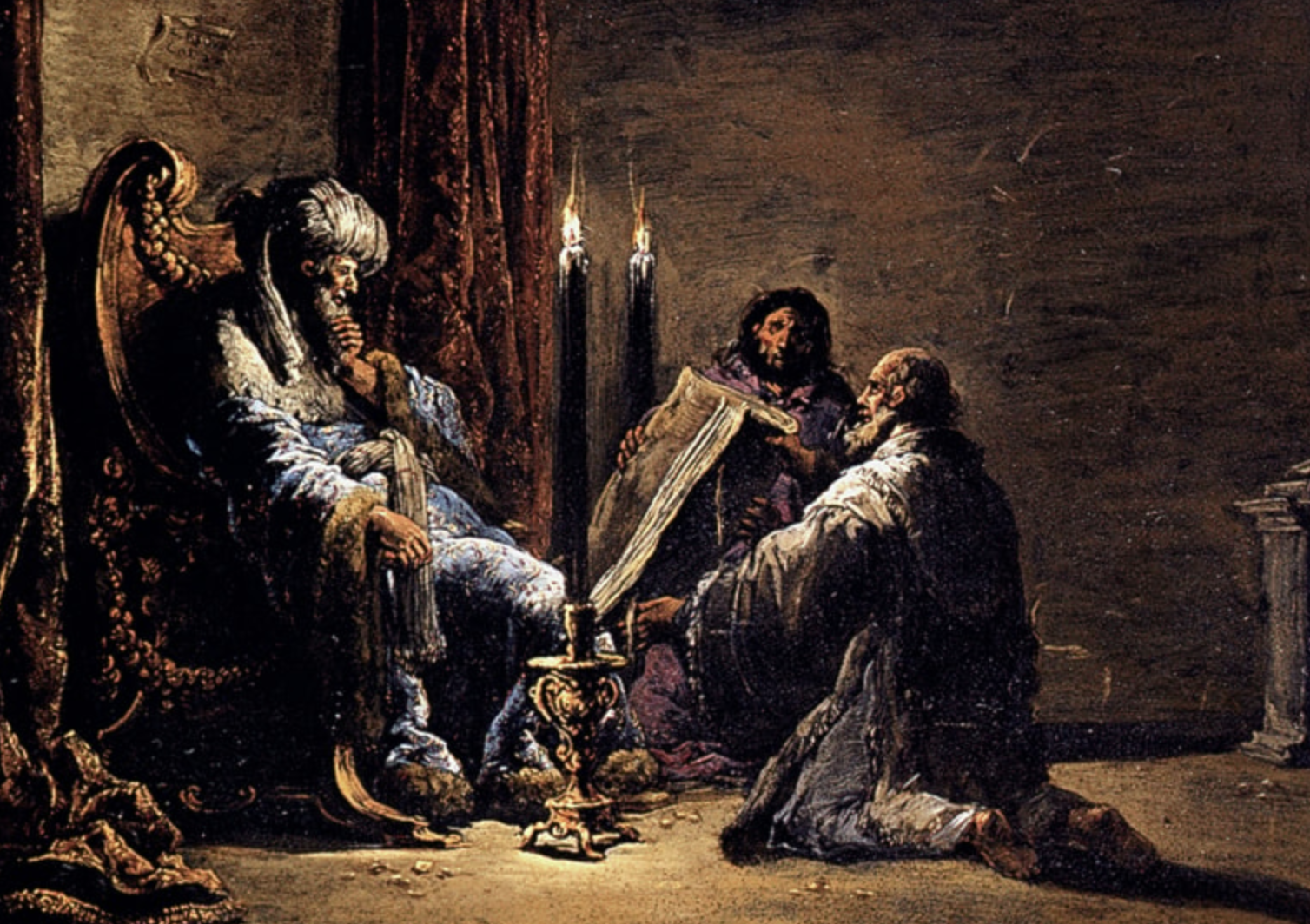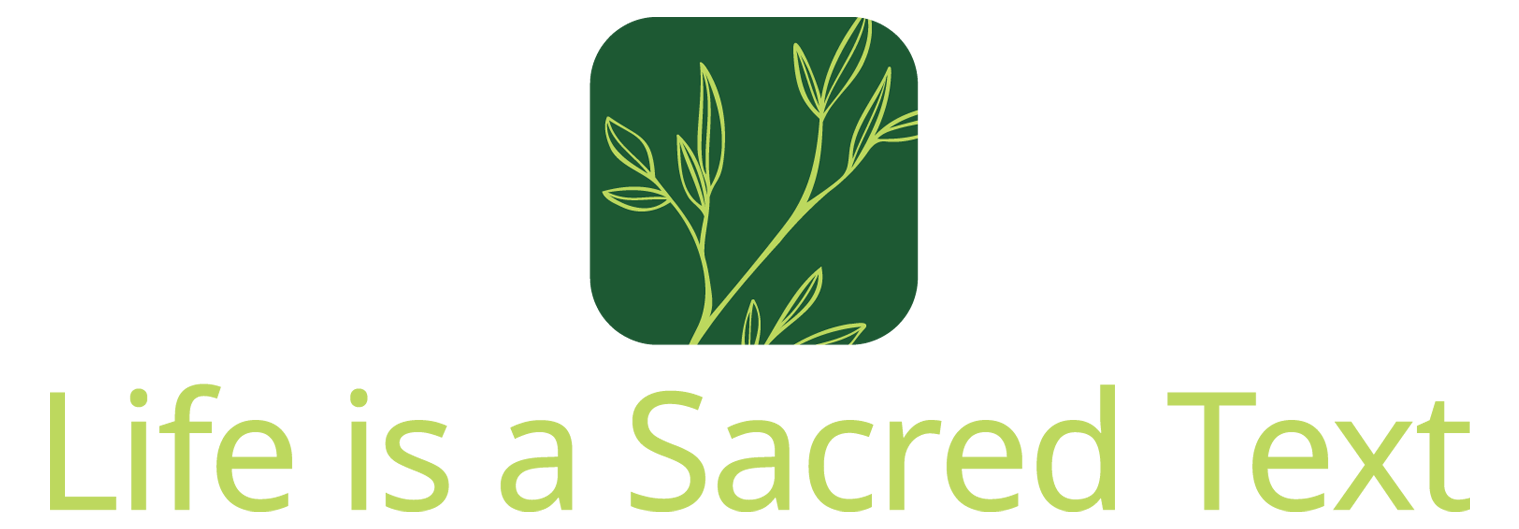Seeking the History Behind The Mythtory
The Backstory On That Scroll They, Uh, Found That One Time

This is Life as a Sacred Text 🌱, an everybody-celebrating, justice-centered voyage into ancient stories that can illuminate our own lives. It‘s run on a nonprofit, so it’s 100% NAZI FREE. More about the project here, and to subscribe, go here:
Over here in the world beyond biblical literalism, we can hold both the fact that the Torah is a book that has a history as does–well, pretty much everything else– and simultaneously tells the story of eternity.
And if this is true, then we can talk about the authorship of Deuteronomy as one layer of the many layers of Torah, one of the myriad ways that we can turn, and turn, and turn it to find light and insight.
We don't have to be limited by history, nor do we need to be afraid of it.
So today we'll focus on the historical context of Deuteronomy, before we dive more into the text itself in the weeks to come.
The story of the fifth book of the Torah actually begins in the section of the Bible we call Prophets, in II Kings 22, in a story about King Josiah, who ruled the southern kingdom of Judea from ca. 640–609 BCE.

After he'd been reigning for a bit– when he was about 26, the text tells us– he sent his scribe Shaphan to the Temple to run an errand related to some renovations that were, evidently, ongoing. Shaphan pops by, and while he was there,
the high priest Hilkiah said to the scribe Shaphan, “I have found a scroll of the Teaching in the House of God.” (II Kings 22:8)
"Oh, hey! We literally just found this thing 📜 when we moved the old bookcases! Do you want it?? There were also some pencils back there, and that goat-slaughtering blade I was looking for two months ago, do you remember?? And some old candy. I'm not sure we should eat the candy, though."
Anyway, as the Book of Kings tells it, Shaphan tells King Josie about scroll that's been found, everybody reads it and decides that it's probably a pretty good idea to do all the stuff that's written "for us" in it. And so Josiah goes on a tear to not only rid Judah of what would, by this scroll, defined as idolatry, but
He brought all the priests from the towns of Judah [to Jerusalem] and defiled the shrines/high places from which the priests had been making offerings—from Geva to Beersheva. (II Kings 23:8; see also 2 Chronicles 34)
That is, to get rid of the bamot (like bimah/pulpit), the local altars from which people would offer sacrifices.
... because, yes, for much of the First Temple Era, though the main site of worship was in Jerusalem, there were (likely) satellite altars in other places, like Beersheva, Arad, Gibeon, Bethel, Bethlehem, and, most famously, Shiloh.

What, you may be asking, does any of this have to do with Deuteronomy? Well, for one, it's generally understood that this "scroll of the Teaching," – sefer Torah – that got "found" in the Temple referred not to any old book, and not to the whole Pentateuch, but just to Deuteronomy. Elsewhere in Genesis-Numbers, the word "torah" (meaning "teaching," or "instruction,") is usually only used in conjunction with a very limited topic, eg: “the torah of the burnt offering,” (Leviticus 6:2). It seems only to be within Deuteronomy that we find the word used to refer to a more extended (written) legal document.
Like:
On the other side of the Jordan...Moses undertook to expound this Torah/Teaching. (Deuteronomy 1:5)
So, II Kings describes the discovery of this scroll/book of the Torah, and then doing a whole bunch of things contained in it. Which happens– huh– to match up just about exactly to the stuff that Deuteronomy tells us to do.
It's always tricky sorting out biblical history from– mythtory– but scholars generally don't believe that Moses' Last Song just somehow went AWOL in the First Temple broom closet. Rather– get your shocked face ready– it's much more likely that the authorship of Deuteronomy dates to the time of Josiah's reign.
In fact, we see parallel literature "finds" in other Ancient Near Eastern cultures, like the Babylonians and, most strikingly and (as you'll see in a moment) notably, the Hittites.
As Bible scholar Jonathan Ben-Dov argues,
A monarch's need for an oracle was felt both in times of distress and in times of serenity; temple renovation represented the cause for an oracle inquiry just as did a disastrous plague.... The book-find was interpreted as traditionally understood in ancient Near Eastern royal courts- that is, as a divine oracle sent to legitimize the king's actions.
So, yeah, this might be kind of like if (please forgive the comparison*) Biden just happened to "discover" the American Rescue Plan roadmap in a time capsule "left" by John Adams in the Oval Office.
*My other option was to come up with something Trump just "happened to find," so this was safer, OK?So: If Deuteronomy was Josiah's agenda, what agenda was that?
There's a longer history of the centralization of the Temple– the process of destroying all these franchise altars, ensuring once and for all that sacrifice really only happened in Jerusalem. And there's what to say about why that was anybody's agenda, which we'll unpack more fully at a a later time, but, needless to say, the Book of Deuteronomy is very interested in getting us on board with this One Temple for One God campaign. Understanding this fact makes a lot of what happens in the text much clearer.
(For example, Deuteronomy ignores rituals whose implementation might require these local sanctuaries, and, rather, reestablishes festivals on the basis of rejoicing and offerings at Temple in Jerusalem.)

Of course, the form and the content of any text are inseparable, but here in particular there's a lot to know about the form in which it is written. Most importantly:
Deuteronomy is a vassal treaty.
That is, it bears a... notably strong resemblance to other Near Eastern treaties between overlord kings and the cities or countries that swear their allegiance to them. especially Hittite vassal treaties. But, of course, there's a key theological twist: God, here, is the monarch, and the Israelites are God’s subjects.
So all this stuff we'll read, as the weeks go on, on a range of levels, because the Torah can exist on multiple levels at once– about the concept of loving God? It was... borrowed from the political life of the Ancient Near East. That is, political loyalty was generally expressed in terms of “love,” which often demanded the vassal’s... wait for it... heart and soul.
But the religion of Israel was, as far as I understand, the only religion that demanded this kind of exclusive loyalty. The God of Israel is a jealous God. Not so much with the ethical nonmanogamy from our Deuteronomic Tetragrammaton, here.
Religious treason is treated as political treason– like when you incite others to idol worship, it's regarded as akin to delivering them to the enemy. And even the blessings and curses that we'll see are found in these kinds of treaties, sometimes even in the order that appear in the Torah.
Most critically, though, is the middle part of the book; whereas other treaties of this time and place might have language intended to assure the loyalty of the treaty partner (here, the Israelites), Deuteronomy decides to impose laws instead. Whether or not it's the most strategic choice? Here we are.
So the book is really kind of a combination of two books– the treaty and the law code. Though it's not the first place this kind of thing exists (Exodus, eg, also has a similar combo platter), Deuteronomy goes harder on the "covenant" aspect by making it more of a vassal treaty– politically-tinged, ruler/subject.
D (the Bible scholar types call it) knew the material from P, the Priestly author of the Torah. It makes sense, right? P was right there, also from the main Jerusalem administration; but since D came from the royal court, rather than the Temple, it had a different agenda, different influences– which played out all over the place.
For example: Deuteronomy puts Priests and Levites in the role of guardians of the law– we hear about them in reference to a set of laws that already existed, were already fixed.
In P, God is anthropomorphic: God created the human in God’s image; needs a House or Tabernacle; appears through the screen of a cloud. We see all sorts of language about seeing God and/or the kavod/glory of God.
D, on the other hand, talks about the Name of God. When God’s kavod appears, it’s depicted as an abstract greatness, not, like, literally seeing God. D defines the sanctuary as a place where God chose to cause God’s name to dwell, not God Godself. It might sound like semantics, but it wasn't to the people listening back in the day.
The material from P, ultimately, draws more inspiration from divine sphere, while D draws from political-national sphere, with this humanistic emphasis with more focus on protecting individual rights, particularly for those most marginalized by society.
There are clear influences from Wisdom literature– an ancient genre that's generally got that "statements by the sages about living virtuously," vibe that prizes understanding and knowledge in its leaders, talks about prosperity and joy and had a bit more of a humanistic bent. (Think: Proverbs.)
Deuteronomy also, as Bible scholar Moshe Weinfeld put it,
“blurred the covenantal pattern by putting it into a homiletic setting.”
That is to say, Deuteronomy isn't only a treaty, but also speech—and, as such, a whole new literary form winds up being created.
Because! Deuteronomy takes the form of a traditional farewell address– the kind particularly encountered during a change in national leadership. And while it also contains elements of military oration, we no longer see (as we did elsewhere in the Torah) God fighting our battles, but, rather, the Israelites doing for themselves.
And yet, for all the secular humanism, such as it is, there's another key development in Deuteronomy:
Here, for the first time, Torah commands the recitation of liturgies.
Because, of course, the centralization of the Jerusalem administration– all that smashing of the franchise altars to make the Temple everybody's main address– has this other impact. As Weinfeld notes,
“The abolition of the scattered holy places created a religious vacuum. This vacuum was filled by liturgy…. Prayer replaced sacrifice.”
And though the recitation of liturgy really takes off during the Babylonian Exile, when they had no Temple at all, it really begins here, in Deuteronomy. It's not individual prayer– it's prayer on behalf of all the Israelites, the whole community, which is a whole other theological ball of wax, and we'll look more closely at a lot of this as time goes on– but broadly speaking: we find, here, yet another move that winds up changing the face of Judea, the Jewish people, and probably the history of the world, in some ways.
So whoever wrote Deuteronomy, and for whatever agenda: thank you. Your ideas, and your, uh... "discovery"... in the Temple opened more doors than I think you could ever have imagined, and has held us in more ways over the millennia than you could have ever understood.
Next week: A spooky guest post, and then back to the races.
🌱🌱🌱🌱🌱🌱🌱🌱🌱🌱🌱🌱🌱🌱🌱🌱🌱🌱🌱🌱🌱🌱🌱🌱🌱
Like this? Get more of it in your inbox every week. 🌱
For free every Monday—sign up at the ‘Subscribe now’ button just below.
And if you become a paid subscriber, that's how you can get tools for deeper transformation, a community for doing the work, and support the labor that makes these Monday essays happen.
A note on the subscription model:
I want my work to be as accessible to as many people as possible, in as many ways as possible. That's why the Monday essays are free, and why we donate subscriptions to anyone for whom paying is a barrier to the House of Study posts.
I also believe people should be paid fairly for their work. Needless to say, these two values sometimes seem to be in conflict, but I do what I can to find a fair balance. I offer many resources for free, and charge for others. When you donate generously or pay at the top of our scale, that helps support the work I do, provides access for those who have fewer resources, pays for the infrastructure and the technical and practical support that it takes to do this, and helps us keep the work sustainable.
And as always, if you want in to the Thursday space but paying isn't for you now, just email support@lifeisasacredtext.com and we'll hook you up.
And if you’d like to underwrite one of these donated subscriptions, you can do so by signing up at one of the higher subscription points.
And if it resonated with you, please share this post.
Sending a big pile of blessings and goodness your way. 💕





